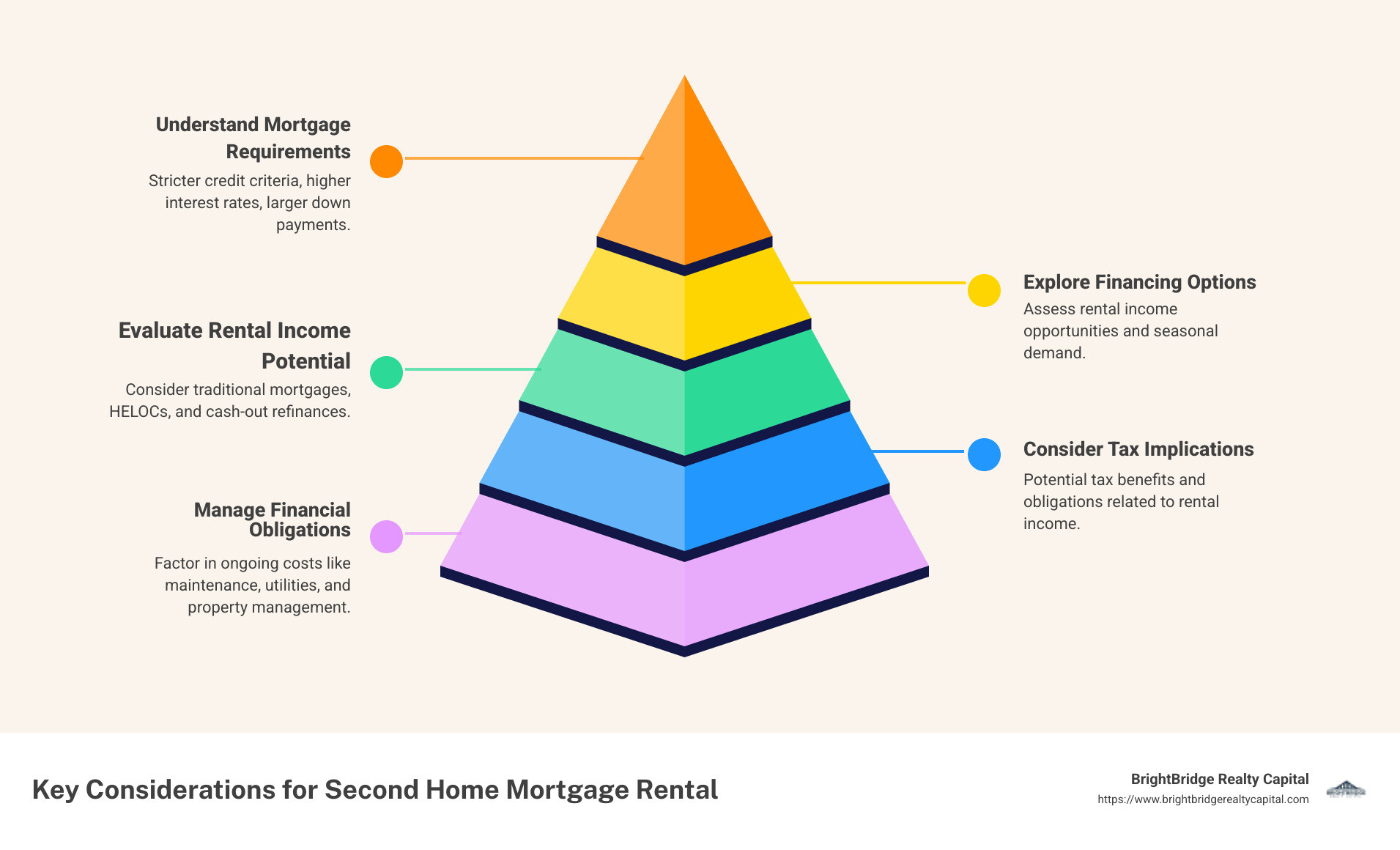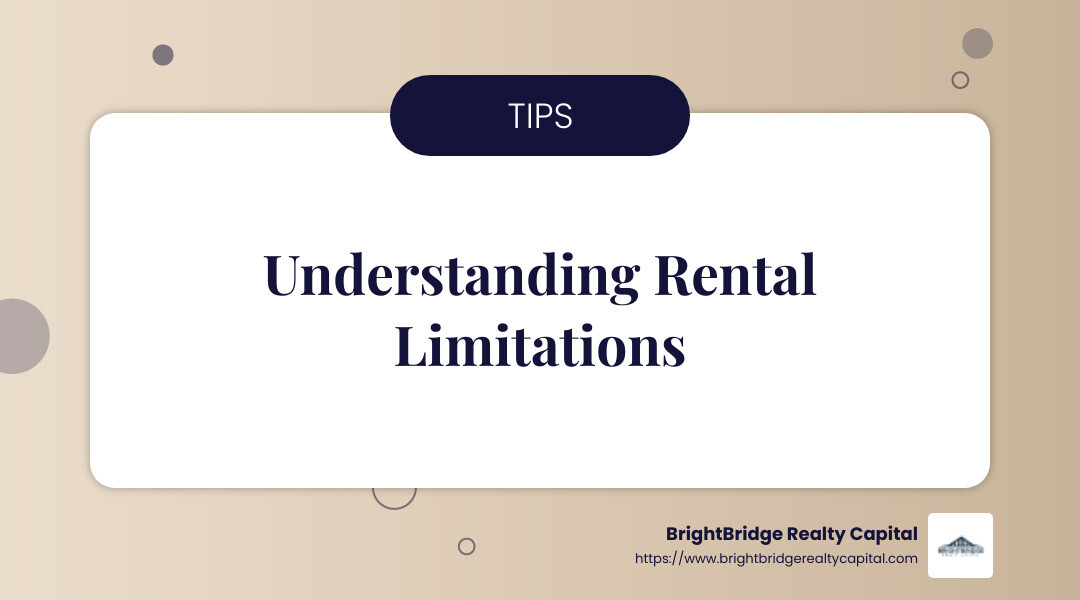Second Home, First Steps: Navigating Mortgage Rentals

Second home mortgage rental is becoming an increasingly popular strategy among real estate investors seeking to diversify their portfolios and maximize returns. For many, purchasing a second home is more than just a chance to own a vacation property—it's about generating rental income, enjoying potential tax benefits, and securing a long-term asset.
Here's a quick look at what you need to know:
Different Rules and Requirements: Financing a second home often involves stricter credit criteria, higher interest rates, and larger down payments compared to primary residences.
Financing Options: Options include traditional mortgages, home equity lines of credit (HELOCs), and cash-out refinances.
Financial Considerations: Beyond the purchase price, consider ongoing costs like maintenance, utilities, and property management fees.
Owning a second home can indeed be a lucrative venture, especially when used as a rental property. However, it's crucial to steer the financial landscape carefully and understand the obligations involved to make an informed investment decision.

Simple second home mortgage rental word guide:
- fannie mae second home rental income
- buying an investment property as a first home
- owner occupied rental property mortgage
Understanding Second Home Mortgages
When exploring second home mortgage rentals, understand the specific requirements and financial considerations involved. These mortgages come with distinct criteria compared to primary home loans.
Mortgage Requirements
Second home mortgages have stricter guidelines. Lenders usually require a higher credit score, a substantial down payment, and a favorable debt-to-income ratio (DTI).
Credit Score: A good credit score is vital. Typically, a score of 680 or higher is recommended. However, if your score falls between 640-679, you might still qualify by offering a larger down payment of 25% or more.
Down Payment: The down payment for a second home is generally at least 10%. This can be higher if your credit score is lower. It's a non-negotiable aspect of the mortgage process.
Debt-to-Income Ratio (DTI): Your DTI should generally not exceed 45%. This means your total monthly debts, including the new mortgage, should be no more than 45% of your gross monthly income.
Flexible Approval
One advantage of second home mortgages is their flexibility. If one part of your application is weaker, like a lower credit score, you can often compensate with a larger down payment or higher cash reserves.
For example, if your credit score is on the lower end, showing 12 months of cash reserves could strengthen your application. This flexibility makes it possible to qualify even without perfect credit or a massive down payment.

Key Takeaways
- Higher Standards: Expect stricter requirements than for a primary home.
- Flexibility: Compensate weaker areas of your application with strengths in others.
- Financial Readiness: Ensure you meet the credit, down payment, and DTI requirements.
Understanding these aspects is crucial for anyone considering a second home mortgage rental. It ensures you're prepared and positioned for a successful application process.
Next, we'll dive into the various financing options available for second homes, including traditional mortgages, HELOCs, and more.
Financing Options for Second Homes
When thinking about second home mortgage rentals, explore the different financing options available. Each option comes with its own benefits and risks, so understanding them can help you make the best choice for your financial situation.
Traditional Mortgage
A traditional mortgage is the most common way to finance a second home. These are usually fixed-rate loans with terms of 15 or 30 years.
- Pros: Predictable monthly payments and potentially lower interest rates compared to other options.
- Cons: Requires a substantial down payment, often at least 10% or more, and a good credit score.
Traditional mortgages offer stability, but they also come with strict qualification criteria. If you have a solid financial profile, this could be a good option.
HELOC (Home Equity Line of Credit)
A HELOC allows you to borrow against the equity of your primary residence. It's like having a credit card with a limit based on your home's value.
- Pros: Flexibility to borrow as needed and pay interest only on the amount used.
- Cons: Variable interest rates and the risk of foreclosure if you can't repay.
HELOCs are great for those who need flexible access to funds but remember, your home is on the line.
Cash-Out Refinance
This involves refinancing your existing mortgage for a larger amount and taking the difference in cash.
- Pros: Access to a lump sum of cash at potentially lower interest rates than other loans.
- Cons: Extends your mortgage term and increases your monthly payments.
A cash-out refinance can be useful if you have significant equity in your primary home and need a large amount of cash upfront.
Securities-Based Line of Credit
This option lets you borrow against the value of your investment portfolio.
- Pros: Quick access to funds without selling your investments.
- Cons: Market fluctuations can affect your borrowing power, and it involves risks if your investments lose value.
Securities-based lines of credit are suitable for those with substantial investment portfolios looking for a short-term financing solution.
When choosing a financing option for a second home, consider your financial goals, risk tolerance, and the specific terms of each loan type. Each option has unique features that can either help or hinder your financial situation, so choose wisely.
Next, we'll explore the key considerations for renting out your second home, including rental income, tax implications, and property management.
Second Home Mortgage Rental: Key Considerations
When it comes to second home mortgage rentals, there are several key factors you need to consider. These include potential rental income, tax implications, property management, and rental limitations.
Rental Income
Owning a second home can provide a steady stream of rental income. However, it's crucial to have realistic expectations. Consider the location and demand for rentals in the area. A popular vacation spot can mean higher rental income, but also more competition.
That rental income isn't guaranteed. There may be periods when the property is vacant, so ensure you can cover the mortgage without relying solely on rental income.
Tax Implications
Renting out a second home comes with tax responsibilities. The IRS has specific rules about rental income and deductions. If you rent the property for more than 14 days a year, you must report the rental income. You can deduct rental expenses, such as property taxes and mortgage interest, but only against the rental income.
Tip: If you use the home for personal use, the expenses must be divided between personal and rental use based on the number of days used for each purpose.
Property Management
Managing a rental property can be demanding. You need to decide whether to handle everything yourself or hire a property manager. A property manager can take care of finding tenants, collecting rent, and handling maintenance issues, but this service comes at a cost.
If your second home is far from your primary residence, a property manager can be particularly helpful. They can ensure the property is well-maintained and occupied, even when you're not around.
Rental Limitations
Before renting out your second home, research any rental limitations. Some lenders have restrictions on how long you can rent out the property. For example, with Rocket Mortgage®, you can rent the property for no more than 180 days a year.
Local regulations can also affect your ability to rent. Some areas have strict rules about short-term rentals, especially in popular tourist destinations. Always check with local authorities and your homeowners' association to ensure compliance.

Understanding these key considerations can help you make informed decisions about your second home mortgage rental. Next, we'll dive into the tax benefits and obligations associated with owning and renting a second home.
Tax Benefits and Obligations
When you own a second home mortgage rental, understanding tax benefits and obligations is crucial. Let's break down some key areas: mortgage interest deduction, property taxes, rental income tax, and depreciation.
Mortgage Interest Deduction
Owning a second home can offer tax advantages through the mortgage interest deduction. If your second home is considered a personal residence, you can deduct mortgage interest on loans up to $750,000 (or $1 million if the loan was taken before December 16, 2017). This deduction can help reduce your taxable income, making homeownership more affordable.
Property Taxes
Property taxes on your second home are also deductible. You can include these in your itemized deductions, which can help lower your taxable income. However, keep in mind that the total deduction for state and local taxes, including property taxes, is capped at $10,000.
Rental Income Tax
Renting out your second home means you'll need to report rental income to the IRS. If you rent the property for more than 14 days a year, the rental income must be declared. The good news? You can deduct expenses related to the rental activity, such as property management fees, repairs, and maintenance, against this income.
Quick Tip: Ensure you keep detailed records of all expenses to maximize your deductions.
Depreciation
Depreciation is another tax benefit you can leverage. It allows you to deduct a portion of the property's cost over several years. This deduction can offset rental income, reducing your overall tax liability. However, it's important to note that any depreciation claimed will reduce the property's cost basis, possibly affecting capital gains tax when you sell.
Navigating these tax benefits and obligations can be complex, so consulting with a tax advisor is advisable. They can help you maximize deductions while ensuring compliance with IRS regulations.
Next, we'll tackle some frequently asked questions about second home mortgage rentals.
Frequently Asked Questions about Second Home Mortgage Rental
What are the requirements for a second home mortgage?
When considering a second home mortgage rental, there are a few key requirements to keep in mind:
Down Payment: You'll need a down payment of at least 10% if you have excellent credit. If your credit score is lower, expect to pay more upfront. This is because lenders view second homes as riskier investments compared to primary residences.
Credit Score: A good credit score is crucial. Most lenders require a minimum score of 640, but higher scores can give you access to better interest rates and terms.
Cash Reserves: Lenders often want to see that you have cash reserves to cover several months of mortgage payments. This is a safety net in case rental income isn't consistent.
Can I rent out my second home?
Yes, you can rent out your second home, but there are limitations:
Rental Limitations: Many lenders and local regulations restrict how often you can rent out a second home. These limitations help maintain the property's status as a second home rather than an investment property.
IRS Guidelines: The IRS has specific rules for rental properties. If you rent out your home for more than 14 days a year, you must declare the income. However, you can also claim deductions for rental expenses, which can help offset this income.
How does renting affect my taxes?
Renting out your second home impacts your taxes in several ways:
Tax Deductions: You can deduct rental-related expenses such as property management fees, repairs, and maintenance. These deductions can reduce your taxable rental income.
Rental Income: All rental income must be reported to the IRS. If you rent the home for more than 14 days, this income is taxable, but you can deduct eligible expenses against it.
Capital Gains: When you sell your second home, any depreciation claimed on the property reduces its cost basis. This can lead to higher capital gains taxes. If the property hasn't been your primary residence for at least two of the past five years, you may not qualify for the capital gains exclusion.
Understanding these aspects of a second home mortgage rental can be complex, but with the right knowledge and planning, you can make informed decisions. Up next, we’ll wrap up with a look at BrightBridge Realty Capital's seamless process for real estate financing.
Conclusion
Navigating second home mortgage rentals can be complex, but it's a journey well worth taking for those looking to expand their real estate portfolio. At BrightBridge Realty Capital, we understand the intricacies involved and offer custom solutions to make the process as smooth as possible.
Real estate financing shouldn't be a headache. That's why we focus on providing quick funding and a seamless process. Our nationwide private lending solutions are designed to close fast, often within a week, so you can seize opportunities without delay.
We cut out the middleman, offering direct lending with competitive rates that are hard to beat. Whether you're looking to finance a second home, an investment property, or need customized loan solutions, we're here to help.
Visit our BrightBridge Realty Capital page to explore how our expert team can assist you in meeting your real estate goals. With us, you're not just getting a loan; you're gaining a partner in your real estate journey.


